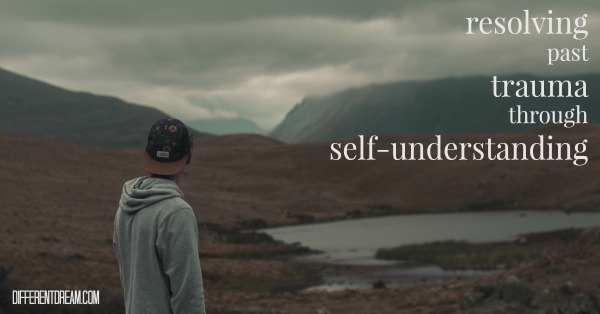Resolving Past Trauma from the Inside Out Through Self-Understanding

Resolving past trauma through self-understanding of this installment of Different Dream’s occasional series about parenting from the inside out. The previous article in the series, Attachment Categories in Adults and Inside Out Parenting, described the four basic kinds of attachments children will develop depending on how they are parented: secure, avoidant, ambivalent, and disorganized.
It also explained how the attachment style parents developed as children can impact how they parent their own children:
- Securely attached children become securely attached adults.
- Avoidantly attached children become dismissive adults.
- Ambivalently attached children become preoccupied adults.
- Disorganizedly attached children become disorganized adults burdened with unresolved trauma.
You can read more about each attachment category and their effects on parenting in the previous post in this series.
The good news is that by resolving past trauma through self-understanding, adults who are dismissive, preoccupied or disorganized can change the way they parent and help their children create secure attachments. Here’s what Daniel Siegel has to say about this good news in his excellent book, Parenting from the Inside Out:
“Research in the field of child development has demonstrated that a child’s security of attachment to parents is very strongly connected to the parent’s understanding of their own early life experiences. Contrary to what many people believe, your early experiences do not determine your fate. If you had a difficult childhood but have come to make sense of those experiences, you are not bound to re-create the same negative interactions with your own children.”
Parenting from the Inside Out also provides a list of self-reflection questions for resolving past trauma through greater self-understanding. You can download the questions by clicking this link: Resolving Past Trauma Through Self-Understanding.
While the questions are a good starting place in the process of resolving past trauma, professional help is sometimes needed. The next article in this series will review several therapy options for people looking for more support.
Inside Out Special Needs Parenting, Part 1
Inside Out Special Needs Parenting, Part 2
Inside Out Special Needs Parenting, Part 3
Inside Out Special Needs Parenting, Part 4
Inside Out Special Needs Parenting, Part 5
Inside Out Special Needs Parenting, Part 6
Inside Out Special Needs Parenting, Part 7
Do you like what you see at DifferentDream.com? You can receive more great content by subscribing to the quarterly Different Dream newsletter and signing up for the daily RSS feed delivered to your email inbox. You can sign up for the first in the pop up box and the second at the bottom of this page.
By Jolene
Jolene Philo is the author of the Different Dream series for parents of kids with special needs. She speaks at parenting and special needs conferences around the country. She’s also the creator and host of the Different Dream website. Sharing Love Abundantly With Special Needs Families: The 5 Love Languages® for Parents Raising Children with Disabilities, which she co-authored with Dr. Gary Chapman, was released in August of 2019 and is available at local bookstores, their bookstore website, and at Amazon.
Subscribe for Updates from Jolene
Related Posts
How Do I Let Go of My Adult EA/TEF Child?
Valeria Conshafter explores the question “How do I let go of my adult EA/TEF child?” for EA/TEF Awareness Month.
The Physical Manifestations of Grief in Caregivers
Jolene explains how the heaviness of loss and sorrow can contribute to the physical manifestations of grief in caregivers.
Experiencing Post-Traumatic Growth while Raising a Child with Disabilities
Jolene explains the benefits of experiencing post-traumatic growth while raising a child with disabilities.






0 Comments